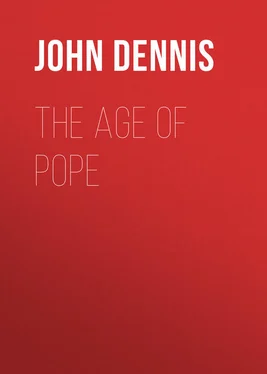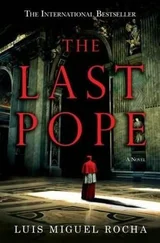John Dennis - The Age of Pope
Здесь есть возможность читать онлайн «John Dennis - The Age of Pope» — ознакомительный отрывок электронной книги совершенно бесплатно, а после прочтения отрывка купить полную версию. В некоторых случаях можно слушать аудио, скачать через торрент в формате fb2 и присутствует краткое содержание. Жанр: foreign_antique, foreign_prose, на английском языке. Описание произведения, (предисловие) а так же отзывы посетителей доступны на портале библиотеки ЛибКат.
- Название:The Age of Pope
- Автор:
- Жанр:
- Год:неизвестен
- ISBN:нет данных
- Рейтинг книги:3 / 5. Голосов: 1
-
Избранное:Добавить в избранное
- Отзывы:
-
Ваша оценка:
- 60
- 1
- 2
- 3
- 4
- 5
The Age of Pope: краткое содержание, описание и аннотация
Предлагаем к чтению аннотацию, описание, краткое содержание или предисловие (зависит от того, что написал сам автор книги «The Age of Pope»). Если вы не нашли необходимую информацию о книге — напишите в комментариях, мы постараемся отыскать её.
The Age of Pope — читать онлайн ознакомительный отрывок
Ниже представлен текст книги, разбитый по страницам. Система сохранения места последней прочитанной страницы, позволяет с удобством читать онлайн бесплатно книгу «The Age of Pope», без необходимости каждый раз заново искать на чём Вы остановились. Поставьте закладку, и сможете в любой момент перейти на страницу, на которой закончили чтение.
Интервал:
Закладка:
Queen Caroline, whose keen intellect was allied to a coarseness which makes her a representative of the age, was considerably attracted by theological discussion. She obtained a bishopric for Berkeley, recommended Walpole to read Butler's Analogy , which was at one time her daily companion at the breakfast-table, and made the preferment of its author one of her last requests to the king. She liked well to reason with Dr. Samuel Clarke, 'of Providence, Foreknowledge, Will, and Fate,' and wished to make him Archbishop of Canterbury, but was told that he was not sufficiently orthodox. Theology was not disregarded under the first and second Georges; it was only religion that had fallen into disrepute. The law itself was calculated to excite contempt for the most solemn of religious services. 'I was early,' Swift writes to Stella, 'with the Secretary (Bolingbroke), but he was gone to his devotions and to receive the sacrament. Several rakes did the same. It was not for piety, but for employment, according to Act of Parliament.'
A glance at some additional features in the social condition of the age will enable us to understand better the character of its literature.
III
It is a platitude to say that authors are as much affected as other men by the atmosphere which they breathe. Now and then a consummate man of genius seems to stand so much above his age as for all high purposes of art to be untouched by it. Like Milton as a poet, though not as a prose writer, his 'soul is like a star and dwells apart;' but in general, imaginative writers, are intensely affected by the society from which they draw many of their intellectual resources. In the so-called 'Augustan age' 3 3 The epithet is used in the Preface to the First Edition of Waller's Posthumous Poems , which Mr. Gosse believes was written by Atterbury, and he considers that this is the original occurrence of the phrase. — From Shakespeare to Pope , p. 248.
this influence would have been felt more strongly than in ours, since the range of men of letters was generally restricted to what was called the Town. They wrote for the critics in the coffee-houses, for the noblemen from whom they expected patronage, and for the political party they were pledged to support.
England during the first half of the eighteenth century was in many respects uncivilized. London was at that time separated from the country by roads that were often impassable and always dangerous. Travellers had to protect themselves as they best could from the attacks of highwaymen, who infested every thoroughfare leading from the metropolis, while the narrow area of the city was guarded by watchmen scarcely better fitted for its protection than Dogberry and Verges. Readers of the Spectator will remember how when Sir Roger de Coverley went to the play, his servants 'provided themselves with good oaken plants' to protect their master from the Mohocks, a set of dissolute young men, who, for sheer amusement, inflicted the most terrible punishments on their victims. Swift tells Stella how he came home early from his walk in the Park to avoid 'a race of rakes that play the devil about this town every night, and slit people's noses,' and he adds, as if party were at the root of every mischief in the country, that they were all Whigs. 'Who has not trembled at the Mohock's name?' is Gay's exclamation in his Trivia ; and in that curious poem he also warns the citizens not to venture across Lincoln's Inn Fields in the evening. Colley Cibber's brazen-faced daughter, Mrs. Charke, in the Narrative of her life, describes also with sufficient precision the dangers of London after dark.
The infliction of personal injury was not confined to the desperadoes of the streets. Men of letters were in danger of chastisement from the poets or politicians whom they criticised or vilified. De Foe often mentions attempts upon his person. Pope, too, was threatened with a rod by Ambrose Philips, which was hung up for his chastisement in Button's Coffee-house; and at a later period, when his satires had stirred up a nest of hornets, the poet was in the habit of carrying pistols, and taking a large dog for his companion when walking out at Twickenham.
Weddings within the liberties of the Fleet by sham clergymen, or clergymen confined for debt, were the source of numberless evils. Every kind of deception was practised, and the victims once in the clutches of their reverend captors had to pay heavily for the illegal ceremony. Ladies were trepanned into matrimony, and Smollett in his History observes, that the Fleet parsons encouraged every kind of villainy. It is astonishing that so great an evil in the heart of London should have been allowed to exist so long, and it was not until the Marriage Act of Lord Hardwicke in 1753, which required the publication of banns, that the Fleet marriages ceased. On the day before the Act came into operation three hundred marriages are said to have taken place. 4 4 Messrs. Besant and Rice's novel, The Chaplain of the Fleet , gives a vivid picture of the life led in the Fleet, and also of the period.
Marriages of a more lawful kind were generally conducted on business principles. Young women were expected to accept the husband selected for them by their parents or guardians, and the main object considered was to gain a good settlement. It was for this that Mary Granville, who is better known as Mrs. Delany, was sacrificed at seventeen to a gouty old man of sixty, and when he died she was expected to marry again with the same object in view. Mrs. Delany detested, with good cause, the commercial estimate of matrimony. Writing, in 1739, to Lady Throckmorton, she says, 'Miss Campbell is to be married to-morrow to my Lord Bruce. Her father can give her no fortune; she is very pretty, modest, well-behaved, and just eighteen, has two thousand a year jointure, and four hundred pin-money; they say he is cross, covetous, and threescore years old, and this unsuitable match is the admiration of the old and the envy of the young ! For my part I pity her , for if she has any notion of social pleasures that arise from true esteem and sensible conversation, how miserable must she be.' 5 5 Life and Correspondence of Mrs. Delany , vol. ii. p. 55.
Girls dowered with beauty or with fortune were not always suffered to marry in this humdrum fashion. Abduction was by no means an imaginary peril. Mrs. Delany tells the story of a lady in Ireland, from whom she received the relation, who was entrapped in her uncle's house, carried off by four men in masks, and treated in the most brutal manner. And in 1711 the Duke of Newcastle, having become acquainted with a design for carrying off his daughter by force, was compelled to ask for a guard of dragoons.
Duelling, against which Steele, De Foe, and Fielding inveighed with courage and good sense, was a danger to which every gentleman was liable who wore a sword. Bullies were ready to provoke a quarrel, the slightest cause of offence was magnified into an affair of honour, and the lives of several of the most distinguished men of the century were imperilled in this way. 'A gentleman,' Lord Chesterfield writes, 'is every man who, with a tolerable suit of clothes, a sword by his side, and a watch and snuffbox in his pockets, asserts himself to be a gentleman, swears with energy that he will be treated as such, and that he will cut the throat of any man who presumes to say the contrary.'
The foolish and evil custom died out slowly in this kingdom. Even a great moralist like Dr. Johnson had something to say in its defence, and Sir Walter Scott, who might well have laughed to scorn any imputation of cowardice, was prepared to accept a challenge in his old age for a statement he had made in his Life of Napoleon .
Читать дальшеИнтервал:
Закладка:
Похожие книги на «The Age of Pope»
Представляем Вашему вниманию похожие книги на «The Age of Pope» списком для выбора. Мы отобрали схожую по названию и смыслу литературу в надежде предоставить читателям больше вариантов отыскать новые, интересные, ещё непрочитанные произведения.
Обсуждение, отзывы о книге «The Age of Pope» и просто собственные мнения читателей. Оставьте ваши комментарии, напишите, что Вы думаете о произведении, его смысле или главных героях. Укажите что конкретно понравилось, а что нет, и почему Вы так считаете.












